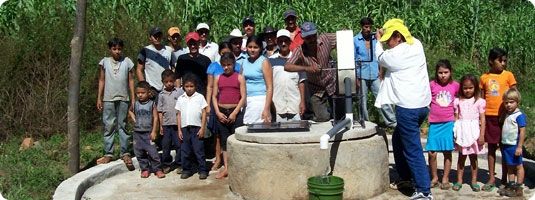Breaking the Cycle of Waterborne Disease

Doña Tomasa lives in La Palma, an islet community in Boaco province, in central Nicaragua. She lives with her two grandchildren, Gabino and Marvin, in a house with wooden walls, a tin roof and a dirt floor. Gabino and Marvin attend the local school, which houses mixed classrooms for grades one through four. Doña Tomasa and her grandchildren travel by boat in order to reach the mainland.
La Palma is a community of about 400 people. Most people make their living from agriculture – planting corn and sorghum, and raising poultry and pigs. However, people in La Palma mainly eat rice and beans. The average income is around 40 Cordobas ($1.80) per day.
Life may seem pretty idyllic in La Palma, but until recently there was one big problem – water. The water in the community well was good for drinking, but the well itself was not built in a way that prevented contamination. It needed plaster walls and a concrete lid, as well as a water pump instead of a bucket, to keep outside germs and pollutants from getting inside and making the clean water undrinkable.
People in La Palma knew that the water in the well could make them sick, but there were no easy alternatives. Diarrhea and other stomach problems were common, and what’s worse, there were no sanitary latrines for people to use. People would row across to the mainland and seek out high grass to provide some privacy while they relieved themselves. This caused more contamination in the water around La Palma, and more disease. “I know this is not hygienic,” said Doña Tomasa, “but what else can we do?”
The cycle of contaminated water and sickness had to stop. Thankfully, Episcopal Relief & Development’s partner in Nicaragua, El Porvenir, was able to help. El Porvenir helped the people of La Palma to repair their well, and built 20 latrines that contain waste so it does not contaminate the environment or water supply. The stomach problems that used to be common are now rare, and Doña Tomasa and her grandchildren are much healthier.
With a big smile, she said, “Thank God that El Porvenir and Episcopal Relief & Development have come to help our community with these health projects!”
El Porvenir’s main focus is water and sanitation, though they also work to protect the environment and improve people’s health through planting trees and building smokeless stoves. In addition, they offer community workshops and educational materials on health and hygiene, and they broadcast a health-centered radio program that reaches 5,000 people.
“We are very pleased to have such a partner as El Porvenir,” said Matthew St. John, Program Officer for Episcopal Relief & Development. “They are extremely knowledgeable about communities in Nicaragua, including common needs and solutions that work in local contexts.”
Episcopal Relief & Development also works with CEPAD (El Consejo de Iglesias Pro-Alianza Denominacional), the Council of Protestant Churches in Nicaragua, of which the Episcopal Diocese of Nicaragua is a member. Through this partnership, small-scale farmers from 14 rural communities are receiving training in improved agriculture techniques, which will help boost crop yield and provide more nutritious food for families in those areas. The initial trainees will train others in their home communities by creating “demonstration plots,” where people can practice the new techniques and see the difference in results compared to traditional methods. In addition to improving nutrition, emphasis is also placed on environmental preservation and soil conservation.
“In Nicaragua, where child malnutrition is high and half the population lives below the poverty line, food insecurity has an impact on every aspect of life,” said St. John. “So when we help communities grow more food, that also has a huge impact. Teaching new farming techniques can really empower a community to lift itself out of poverty, and it is great to see this happening with the help of our local partners.”
Through El Porvenir and CEPAD, Episcopal Relief & Development is helping Doña Tomasa and thousands of others in Nicaragua to live fuller, healthier lives. Having nutritious food and clean water makes it possible for people to care for their families, pursue education and employment and create a better future for themselves and their communities.


